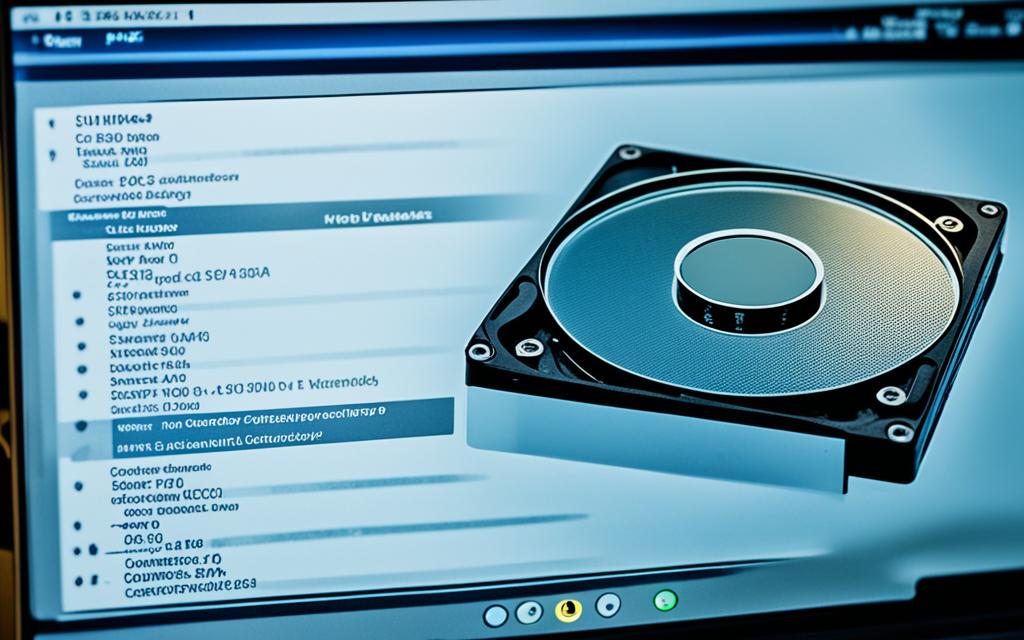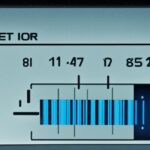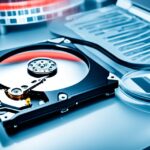Table of Contents
If you’re a Mac user facing HDD issues, it might seem scary. Knowing how to deal with common hard drive problems is key to keeping your Mac running well. Whether it’s crashes, corrupted files, or issues with external drives, this guide will help. Follow these steps to find and fix any hard drive problems. Regular checks and maintenance, like using Disk Utility, are crucial. They help prevent bigger issues and keep your drives running smoothly123.
Key Takeaways
- Regularly check your hard drive’s health to preemptively catch issues.
- Use Disk Utility for basic repairs and maintenance.
- Be alert for signs of mechanical failure, such as unusual noises.
- Always have a backup plan in place with reliable software like Time Machine.
- Consider the power supply when using external drives for stability.
- Seek professional assistance if persistent problems occur.
Understanding Common Mac Hard Drive Issues
Many Mac users experience hard drive problems, showing signs that need quick action to prevent data loss. Key signs of a failing hard drive include apps quitting unexpectedly, corrupt files, and issues with external drives when hardware fails. Mac hard drive troubles often involve getting stuck on the Apple logo or failing Disk Utility tasks4. Spotting these warning signs early can help reduce the damage from these failures.
Identifying Symptoms of Hard Drive Failure
If your Mac starts slowing down during startup or when opening apps, it might mean trouble5. Hearing odd noises from your drive is a clear sign something’s wrong. Also, getting messages about low space on your startup disk can affect your Mac’s performance4. Keeping an eye on your hard drive’s health with S.M.A.R.T. tools can warn you of these issues, leading to timely action5.
Typical Warning Signs to Observe
- Frequent system crashes and unexpected shutdowns.
- Inaccessibility of files or folders without prior notice.
- Visible increases in corrupted files alongside a high number of missing documents.
- Experiencing slow response times from the Mac system.
- Unusual mechanical noises from the internal drive.
For users noticing these HDD warning signs, it’s important to back up data often. Use solutions like Time Machine for this. If the signs get worse, think about getting help from professional recovery services or data recovery software. Taking action early keeps your system running smoothly and keeps you productive.
Explore more about Mac hard drive issues here
Common Symptoms: When a Mac Computer Is Reporting Problems with the HDD
Knowing when your hard drive might be failing is crucial for a good Mac experience. Watch out for strange noises, system crashes, or any issues with your Mac’s performance. These signs could point to serious hardware problems. Spotting them early can help you save important data and keep your Mac running well.
Unusual Noises and System Crashes
You might hear grinding or clicking noises if your hard drive is in trouble. These sounds, along with system crashes and the dreaded blue screen, mean you need to act fast. They’re warning signs of possible data loss and hardware issues6.
Performance Issues and Data Corruption
Is your Mac running slow? Are files missing or corrupted without explanation? These are signs of a hard drive struggling to work properly. Running SMART tests can show if your hard drive is “Failing.” You might need to take action to get things back to normal6.
It’s also key to ensure your external hard drives are in good shape. Missing icons and error messages in Finder could signal data risks7. Unexpected requests to eject drives add to the worry. Stay alert to these issues to protect your data.
| Symptom | Description | Potential Cause |
|---|---|---|
| Unusual Noises | Grinding or clicking sounds indicating hardware issues | Possible hard drive failure |
| System Crashes | Frequent freezing or crashing of the operating system | Software or hardware malfunction |
| Slow Performance | Delayed responses and long loading times | Overheated Mac or HDD strain |
| Data Corruption | Missing or corrupted files affecting usability | Inconsistent power supply or hardware problems |
Staying aware of these symptoms can help you react quickly. This way, you can protect your Mac and keep it running longer.
Utilising Disk Utility for Troubleshooting
Disk Utility is crucial for Mac users. It diagnoses and fixes different hard drive problems. By using Disk Utility, you can tackle issues like apps crashing or problems with external devices. It’s key for keeping your storage device healthy by spotting possible faults early.
Accessing Disk Utility on Your Mac
To open Disk Utility, go to Applications, then Utilities. Alternatively, use Spotlight by pressing Command + Space and entering “Disk Utility.” If your Mac won’t start, access Disk Utility through macOS Recovery. Just hold Command + R while starting up. You can then choose the storage device you wish to examine.
How to Repair a Storage Device
The First Aid feature in Disk Utility helps you check and mend storage devices. Just pick the volume or container and click on First Aid. This action performs checks and may fix some issues, though not all. It’s critical to back up your data before, as repairs can lead to lost data8. If problems remain, think about reformatting the disk and reinstalling macOS to get things working again. Carrying out regular checks, like reviewing SMART status with First Aid, can prevent issues in the future, ensuring your Mac runs smoothly9.
Specific Hard Drive Problems and Solutions
Facing issues with your Mac’s hard drive can be tricky. Luckily, there are solutions for slow speeds, low storage, or when the drive isn’t showing up. Getting to grips with these problems will make your Mac run better.
Mac Hard Drive Running Slow
Is your Mac running slow? You might want to delete files and apps you don’t use anymore. You could also improve its performance by adding more RAM or switching to an SSD. Try running Disk Utility’s First Aid to fix small problems that slow down your hard drive.
Low Storage Capacity Errors
Not having enough storage can make your Mac slow. Getting rid of caches and temporary files is a good start to fix this. Also, check regularly for things you don’t need and delete them to keep your Mac running well.
Hard Drive Not Showing Up
If your hard drive doesn’t show up in Disk Utility, it might be a connection problem. Make sure the SATA connections are secure. If you’re still having trouble, especially with an external HDD, data recovery might be necessary. Remember, backing up your data is crucial because many hard disks fail every year10. By understanding why these problems happen, you can keep your Mac’s hard drive in top shape11.
FAQ
What are the common symptoms of hard drive failure on a Mac?
Common symptoms include apps quitting unexpectedly and files getting corrupted. You might also hear odd noises like clicking or grinding. Overheating and frequent crashes are serious signs too.
How can I access Disk Utility on my Mac?
You can find Disk Utility in the Utilities folder inside Applications. If your Mac won’t start, hold Command + R during startup. This will get you to Recovery Mode where you can access Disk Utility.
What steps should I take if my Mac hard drive is running slowly?
If your Mac’s hard drive is slow, start by removing files you no longer need. Use Disk Utility to repair the drive. Consider upgrading the hardware for better speed.
What should I do if my hard drive is not showing up in Disk Utility?
If your hard drive isn’t seen in Disk Utility, first check the SATA connections. If issues continue, look into data recovery or get help from a pro.
How often should I run diagnostic checks on my hard drive?
It’s smart to run checks on your hard drive now and then using Disk Utility. Doing this regularly helps catch issues early, saves your data, and keeps the drive working longer.
What can be done to resolve low storage capacity errors on a Mac?
To fix errors from low storage, clear cache and temp files. Delete big files you don’t use any more. Disk Utility can also help manage space better.
To tackle performance drops from data corruption, use Disk Utility’s First Aid. Backing up your data is crucial too. Keeping your system clean boosts performance.
Source Links
- https://news.macgasm.net/miscellaneous-news/external-hard-drive-not-showing-up-mac/ – External Hard Drive Is Not Showing Up on a Mac | 7 Solutions
- https://www.geeksforgeeks.org/fix-hard-drive-not-showing-up-on-mac/ – How to Fix Hard Drive Not Showing Up on Mac? – GeeksforGeeks
- https://cleanmymac.com/blog/test-mac-hard-drive – Find out these easy-to-follow tips to test Mac hard drive.
- https://www.stellarinfo.com/article/mac-hard-drive-problems-with-solutions.php – A Guide to Solving Mac Hard Drive Problems
- https://www.cleverfiles.com/howto/disk-failure-mac.html – Detecting Disk Failure on a Mac [2022 Updated]
- https://recoverit.wondershare.com/harddrive-errors/mac-hard-drive-failure.html – Symptoms, Fixes, and Data Recovery
- https://www.pitsdatarecovery.com/blog/external-hard-drive-not-mounting-mac/ – My External Drive Keeps Unmounting After Restarting Mac
- https://support.apple.com/guide/disk-utility/repair-a-storage-device-dskutl1040/mac – Repair a storage device in Disk Utility on Mac
- https://scot-comp.co.uk/how-to-handle-imac-hard-drive-smart-errors/ – How to Handle iMac Hard Drive SMART Errors
- https://www.harddrivefailurerecovery.net/hard-drive-failure/ – Hard Drive Failure Signs, Fix & Causes
- https://discussions.apple.com/thread/254572440 – Mac doesn’t recognize external hard drive…












